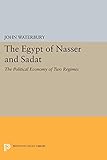The Egypt of Nasser and Sadat : The Political Economy of Two Regimes / John Waterbury.
Material type: TextSeries: Princeton Studies on the Near East ; 515Publisher: Princeton, NJ : Princeton University Press, [2014]Copyright date: ©1983Edition: Course BookDescription: 1 online resource (502 p.)Content type:
TextSeries: Princeton Studies on the Near East ; 515Publisher: Princeton, NJ : Princeton University Press, [2014]Copyright date: ©1983Edition: Course BookDescription: 1 online resource (502 p.)Content type: - 9780691613499
- 9781400857357
- 338.962
- online - DeGruyter
- Issued also in print.
| Item type | Current library | Call number | URL | Status | Notes | Barcode | |
|---|---|---|---|---|---|---|---|
 eBook
eBook
|
Biblioteca "Angelicum" Pont. Univ. S.Tommaso d'Aquino Nuvola online | online - DeGruyter (Browse shelf(Opens below)) | Online access | Not for loan (Accesso limitato) | Accesso per gli utenti autorizzati / Access for authorized users | (dgr)9781400857357 |
Browsing Biblioteca "Angelicum" Pont. Univ. S.Tommaso d'Aquino shelves, Shelving location: Nuvola online Close shelf browser (Hides shelf browser)

|

|

|

|

|

|

|
||
| online - DeGruyter Feasting With Cannibals : An Essay on Kwakiutl Cosmology / | online - DeGruyter The Transparent Lyric : Reading and Meaning in the Poetry of Stevens and Williams / | online - DeGruyter Russia : On the Eve of War and Revolution / | online - DeGruyter The Egypt of Nasser and Sadat : The Political Economy of Two Regimes / | online - DeGruyter Alexander Pope and the Traditions of Formal Verse Satire / | online - DeGruyter Fictions of the Self, 1550-1800 / | online - DeGruyter The Semantics of Desire : Changing Models of Identity from Dickens to Joyce / |
Frontmatter -- Contents -- Tables -- Preface -- Acknowledgments -- A Note on Transliteration -- A Note on Citations -- Abbreviations -- Part I. The State's Room for Maneuver -- One. The Nature of the State and of the Regime -- Two. Sovereign State or Link in the Chain of Dependency? -- Three. Demographic Reality and Revolutionary Intent -- Part 2. The Shifting Fortunes of State Capitalism -- Four. The Emergence of Egypt's Public Sector -- Five. The Public Sector in Crisis -- Six. The Public Sector: Performance and Reform -- Seven. The Open Door to the Triple Alliance -- Eight. The Private Sector: Out of the Shadows -- Nine. Reprise: Accumulation and Deepening -- Part 3. The Impact of Social Engineering -- Ten. Equity and Inequity without Pain -- Eleven. State and Class -- Twelve. Land Tenure and Rural Class -- Part 4. Politics without Participation -- Thirteen. The Arab Socialist Union: Corporatism and Containment -- Fourteen. Instruments and Processes of Control -- Fifteen. Controlled Liberalization under Sadat -- Part 5. Regional and International Dependency -- Sixteen. Socialist and Capitalist Dependency -- Seventeen. The Club of Friends -- Conclusion -- Bibliography -- Index
restricted access online access with authorization star
http://purl.org/coar/access_right/c_16ec
A balance sheet of thirty years of revolutionary experiment, this work is a comprehensive analysis of the failure of the socialist transformation of Egypt during the regimes of Nasser and Sadat. Testing recent theories of the nature of the developing states and their relation both to indigenous class forces and to external pressures from advanced industrial societies, John Waterbury describes the limited but complex choices available to Egyptian policy-makers in their attempts to reconcile the goals of reform and capital accumulation.Originally published in 1983.The Princeton Legacy Library uses the latest print-on-demand technology to again make available previously out-of-print books from the distinguished backlist of Princeton University Press. These editions preserve the original texts of these important books while presenting them in durable paperback and hardcover editions. The goal of the Princeton Legacy Library is to vastly increase access to the rich scholarly heritage found in the thousands of books published by Princeton University Press since its founding in 1905.
Issued also in print.
Mode of access: Internet via World Wide Web.
In English.
Description based on online resource; title from PDF title page (publisher's Web site, viewed 30. Aug 2021)


